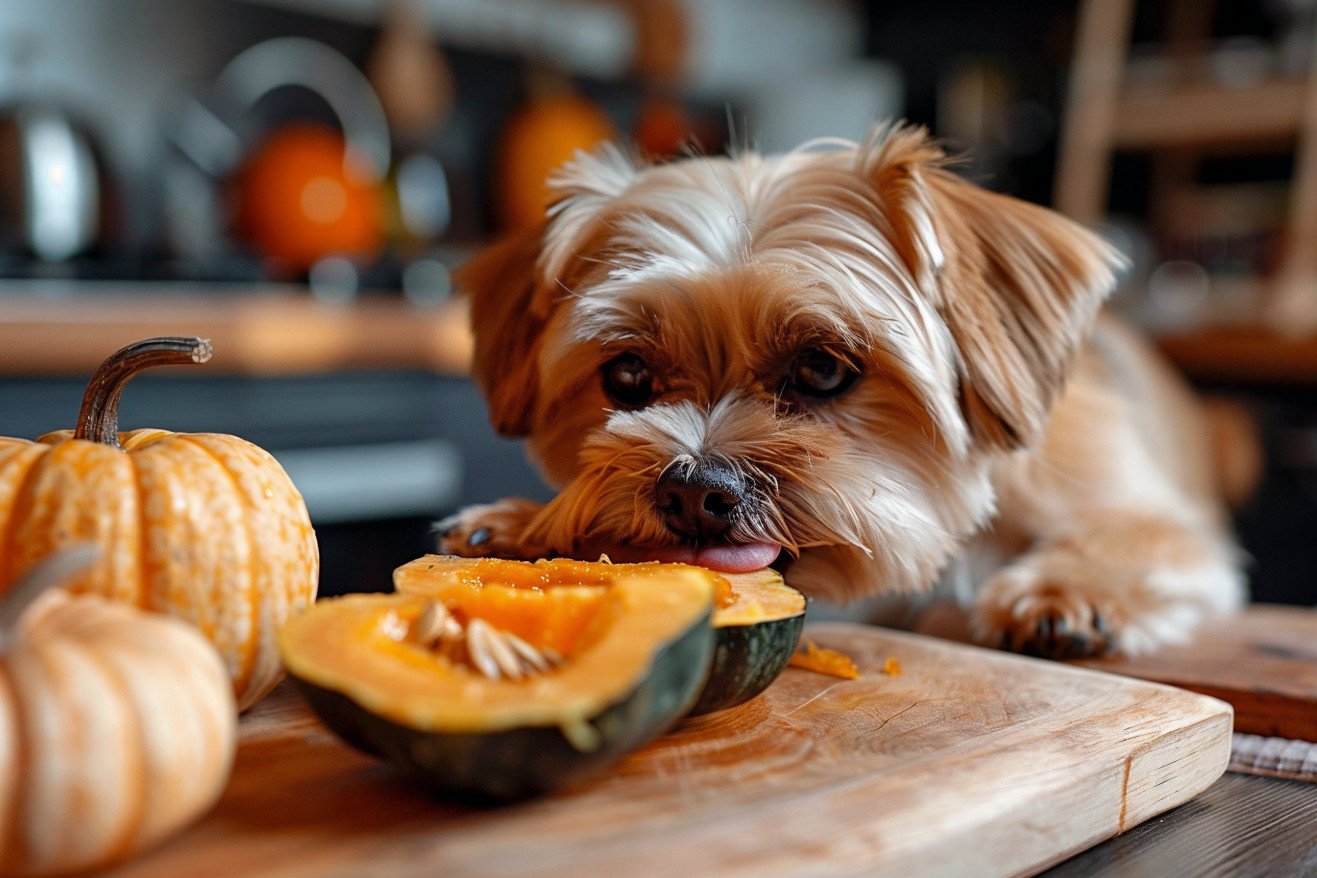Can Dogs Eat Acorn Squash? A Nutritious Occasional Treat
2 May 2024 • Updated 1 May 2024

From boiling and baking to microwaving, acorn squash can be prepared in a way that makes it a nutritious, occasional treat for your dog. While acorn squash isn't poisonous to dogs, it should be given in moderation because it's high in fiber, which can lead to digestive upset if it's consumed in large amounts. Make sure to remove the skin and seeds, cook the squash well to make it easier to digest, and adjust portion sizes based on your dog's individual needs and activity level.
In this evidence-based article, we'll explore information provided by veterinary nutritionists and other animal care professionals to help you better understand the nutritional content of acorn squash for dogs. We'll also cover how much acorn squash you should give your dog, the potential downsides of giving them too much, and some fun ways to give this nutritious vegetable to your dog as a tasty snack. Let's get started.
Can dogs eat acorn squash?
Nutritional Benefits of Acorn Squash for Dogs
Acorn squash is a nutritious food that can offer a number of advantages if you decide to feed it to your dog. It's high in vitamins A and C, which can help strengthen the immune system and support eye and skin health. The fiber in acorn squash can also promote gut health and help with weight management. In addition, acorn squash is a good source of antioxidants, including beta-carotene, that may help lower inflammation and the risk of certain diseases.
Acorn squash is also a great way to ensure your dog gets important minerals in their diet. It contains calcium, which is important for bone health and muscle function, iron, which can help prevent iron-deficiency anemia, and potassium, which is essential for muscle function and nerve impulses. While these nutrients make acorn squash a great option for dogs, it's important to remember that it's high in fiber, so you should only feed it to your dog in moderation to avoid any digestive issues. That said, acorn squash can be a great way to ensure your dog gets important vitamins, minerals, and antioxidants in their diet.
How to Prepare and Serve Acorn Squash to Dogs
If you want to feed your dog acorn squash, there are a few things to keep in mind. First, you need to prepare the squash. This means removing the skin, seeds, and stem, all of which can cause digestive problems or blockages, according to Wag!. Next, the squash should be cooked by roasting, baking, or steaming. This will make it easier for your dog to digest and reduce the risk of gastrointestinal issues, according to Dutch.
When preparing acorn squash for dogs, it's important to avoid adding any seasonings, oils, or other ingredients that could be harmful, according to Daily Paws. The appropriate serving size of acorn squash for dogs depends on their size, age, and activity level, but it should not exceed 10% of their daily caloric intake, according to Dutch.
If you want to add acorn squash to your dog's diet, it's best to start by feeding them a small amount and watching for any negative side effects, since some dogs may be sensitive or allergic to it, according to Wag!. By following these preparation and serving tips, you can safely give your dog this healthy vegetable.
Potential Risks and Precautions
Although acorn squash is safe for dogs, the seeds and skin can cause digestive upset or blockages if eaten, according to the German Shepherds Forum. The high fiber content of acorn squash can also cause gastrointestinal issues like diarrhea or vomiting if consumed in large quantities, per The Native Pet.
In addition, some dogs may be allergic to acorn squash, and eating it may cause symptoms like itching, swelling, or digestive upset, according to Herbsmith. Dogs with certain health conditions, such as diabetes or obesity, should be checked by a vet before being fed acorn squash. Finally, acorn squash should not be given to dogs along with other high-fiber foods, as this can increase the likelihood of digestive upset.
Raw vs. Cooked Acorn Squash
Although some dogs may be able to eat raw acorn squash, it’s best to cook it first to make it easier for your dog to digest and to avoid any potential tummy troubles, says Daily Paws. Cooking methods such as roasting, baking, or steaming can help to break down the fibers in acorn squash, which will make it easier for dogs to digest, explains the Doberman Chat Forum.
Raw acorn squash may be harder for dogs to chew and digest, especially for senior dogs and small dogs with weaker teeth and jaws. The ASPCA recommends feeding raw acorn squash in small amounts and watching for any negative reactions, as some dogs may be more sensitive to it than others. In general, whether it’s raw or cooked, acorn squash should be served plain with no added spices, oils, or other ingredients that could be harmful to dogs.
Fun Ways to Give Your Dog Acorn Squash
According to Monica Segal, roasted or steamed acorn squash can be added to your dog’s regular kibble or wet food for a tasty and nutritious boost. Meanwhile, pureed acorn squash can be used as a healthy filling or topping for homemade dog chews or treats. In addition, DogTime recommends serving small cubes or slices of cooked acorn squash as a snack or training reward.
To make a more complete meal, combine acorn squash with other dog-safe foods like lean proteins, vegetables, or grains to make a well-balanced homemade meal. Meanwhile, if your dog enjoys the taste, you can also give them frozen acorn squash puree cubes as a cool, hydrating treat in the summer, says Preventive Vet.
These fun ways to give your dog acorn squash can help ensure that you give your pet a healthy and enjoyable occasional treat.
Conclusion: A Healthy Occasional Snack for Dogs
When given in moderation and prepared properly, acorn squash can be a nutritious and healthy part of a dog's diet. It is full of important vitamins, minerals, fiber, and antioxidants that can help with everything from digestion to vision to the immune system. While it is safe for dogs, it is important to introduce acorn squash slowly and watch for any reactions or sensitivities.
It is also important to prepare it properly, which includes removing the skin and seeds and cooking it thoroughly to make it safe and easy to eat. When given in the right portion sizes and added to a dog's diet in fun and interesting ways, acorn squash can be a fun and healthy occasional snack.


